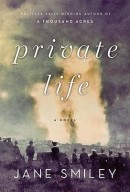 Smiley’s 13th novel has garnered very mixed reactions. It follows a character named Margaret from 1883 to 1942, from a troubled childhood (two brothers die, her father commits suicide) to a troubled marriage with an eccentric (insane?) astronomer named Andrew. In a blurb-ready rave in the Washington Post, Marie Arana calls the novel “extraordinarily powerful . . . brilliantly imagined, carefully chiseled.” Others are qualified in their admiration. In the New York Times, Sven Birkerts concludes:
Smiley’s 13th novel has garnered very mixed reactions. It follows a character named Margaret from 1883 to 1942, from a troubled childhood (two brothers die, her father commits suicide) to a troubled marriage with an eccentric (insane?) astronomer named Andrew. In a blurb-ready rave in the Washington Post, Marie Arana calls the novel “extraordinarily powerful . . . brilliantly imagined, carefully chiseled.” Others are qualified in their admiration. In the New York Times, Sven Birkerts concludes:
Private Life reflects the pressures of the larger world on the most intimate aspects of personal existence. . . . Smiley lets [historical] events infiltrate her narrative even as she keeps Margaret’s sad marriage squarely in the foreground. Through every scene and revelation, she keeps in mind the moment she’s building toward: the completion of Margaret’s long-deferred self-recognition. What she finally delivers has a Jamesian twist of the unforeseen, but it’s achieved with a sureness of hand that’s all her own.
Heller McAlpin at the Barnes & Noble Review says the book “is all about detachment, repression, and frustration. It’s a dreary read — but there’s still much of interest here.” As for the book’s real-life incidents (Pearl Harbor, the influenza epidemic, etc.), McAlpin thinks that “public cataclysms scroll by like crudely painted sets behind the play Margaret feels her life to be. The result is not just a protagonist cut off from her own life — as Smiley intended — but a narrative whose relationship with its readers feels similarly unfulfilling.”
In the Los Angeles Times, Richard Eder strikes the most consistently sour notes, saying, “Smiley has points to make, and if blunt, they are not without interest. As a novel, though, Private Life is a ragged affair. There is compelling tension in the early days of the marital standoff, and in following the construction of Andrew as a grotesque. After a while, though, he is too predictably mad and Margaret too predictably hapless to sustain any convincing narrative momentum.”
The novel elicited similar reactions from two women who reviewed it. Arana wrote, “[Private Life] kept me up all night, long after I’d finished it, remembering the lives of my mother and grandmothers, recalling every novel about women I had ever read, from Anna Karenina to My Antonia
.” And in the Globe & Mail, Susan Swan says:
Of course, an indictment of middle-class marriage isn’t new. However, I read parts of Smiley’s novel to my 90-year-old mother and, afterward, we found ourselves wondering about our dead female relatives. Had one great aunt really been happy with the man she married to please her mother? And did a great-grandmother let herself be sent to a sanitarium so she could escape domestic chores? I’m sure Smiley would have enjoyed hearing us talk about our female ancestors.
Private Life by Jane Smiley
Knopf, 336 pp., $26.95

